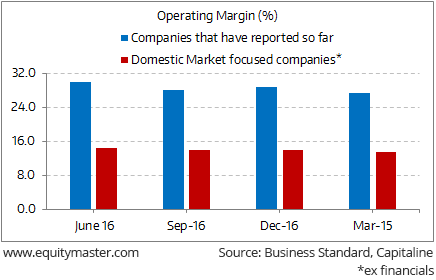Investment in securities market are subject to market risks. Read all the related documents carefully before investing
Grab Our Small Cap Recommendation
Service at a 60% Discount
- Home
- Todays Market
- Indian Stock Market News May 25, 2017
Indian Indices Continue Momentum; Capital Goods Sector Up 2.1% Thu, 25 May 11:30 am
After opening the day on a positive note, stock markets in India have continued their momentum. Sectoral indices are trading on a mixed note with stocks in the capital goods sector and IT sector witnessing maximum buying interest. Healthcare stocks are trading in the red.
The BSE Sensex is trading up 187 points (up 0.6%) and the NSE Nifty is trading up 57 points (up 0.6%). The BSE Mid Cap index is trading up by 0.6%, while the BSE Small Cap index is trading up by 1%. The rupee is trading at 64.51 to the US$.
Indian share markets are trading on a positive note today on the back of a host of domestic as well as global financial developments.
On the domestic front, the expiry of futures & options (F&O) contracts and result announcements by various companies are seen as the key market drivers.
One must note that there's much hoopla surrounding the ongoing earnings season. However, if one has to go by the year-on-year performance, there's nothing much to cheer.
The earnings growth has slid in FY17. This is despite the lower tax outgo and other income boost. Domestic market focused companies too have slowed down due to notebandi.
This trend can be seen clearly in the chart below:
Earnings in Contrast with Market Trends

One must also note that the actual performance for the last quarter of FY17 has been much below brokerage estimates.
All of this brings us to the question of how can one make money in a volatile market, with little support from earning trends and with brokerages getting it all wrong?
We believe a few super investors could provide the clue. These are the guys who've beaten the markets black and blue and have an eye for multi bagger stocks irrespective of the macro environment.
With respect to which super investors to follow, my colleague Kunal and Rohan have could be of great help courtesy their project, The Superinvestors of India.
To know more about these superinvestors and their stock picking approach, download a free copy of - The Super Investors Of India.
For global markets, most of the activity today came after the Fed signaled gradual tightening in interest rates.
The US Federal Reserve signaled a cautious approach for future interest rate hikes and for reduction of its US$ 4.5 trillion of bond holdings.
Minutes of the Fed's last policy meeting showed Fed policymakers agreeing to hold off interest rate hikes until it was clear a recent US economic slowdown was temporary.
Fed policymakers also proposed that the central bank should set a cap on the amount of bonds that would be allowed to run off each month. They proposed to do so by initially setting the amount at a low level and raising it every three months.
The minutes also showed Fed policymakers favoring a gradual reduction in its massive balance sheet.
Just Released: Multibagger Stocks Guide
(2017 Edition)
In this report, we reveal four proven strategies to picking multibagger stocks.
Well over a million copies of this report have already been claimed over the years.
Go ahead, grab your copy today. It's Free.

One shall note that most Fed policymakers think the central bank should take steps to trim its balance sheet later this year as long as the economic data holds up.
However, trimming the balance sheet would tighten financial conditions.
Normalising the balance sheet could also impact emerging markets.
Since 2008, the Fed's swelling balance sheet has propped up the US economy. And it has aided the rally in emerging markets all these years.
So any change to the Fed's balance sheet will have an immediate impact on emerging stock markets.
The above announcements by the Fed have fueled volatility and uncertainty in stock markets across the globe.
Only time will tell how this all pan out. Meanwhile, we'll keep you posted on the latest developments.
In other news from domestic financial markets, the Union Cabinet has cleared seven decisions including abolition of Foreign Investment Promotion Board (FIPB) and Strategic Partnership for defense manufacturing.
Further, in line with the government's Make in India policy, the Union Cabinet also approved the public procurement policy. This opens up a potentially US$ 600 billion-plus market for Indian manufacturers and services companies.
The policy makes it mandatory to give first preference to domestic suppliers in all government purchases worth over Rs 5 lakh and also covers autonomous bodies and state-run companies and other entities.
Apart from that, the Cabinet also approved raising of Rs 23.6 billion via bonds through the Indian Renewable Energy Development Agency (IREDA) during 2017-18, thereby giving a boost to India's commitment to renewable energy.
For information on how to pick stocks that have the potential to deliver big returns, download our special report now!
Read the latest Market Commentary


Equitymaster requests your view! Post a comment on "Indian Indices Continue Momentum; Capital Goods Sector Up 2.1%". Click here!
Comments are moderated by Equitymaster, in accordance with the Terms of Use, and may not appear
on this article until they have been reviewed and deemed appropriate for posting.
In the meantime, you may want to share this article with your friends!